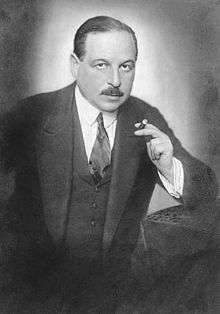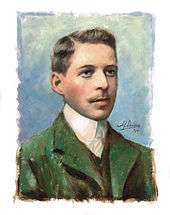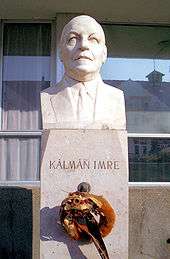Emmerich Kálmán

Emmerich (or Imre) Kálmán (24 October 1882 – 30 October 1953) was a Hungarian composer of operettas.
Biography
Kálmán was born Imre Koppstein in Siófok, then in Austria-Hungary, on the southern shore of Lake Balaton, in a Jewish family.
Kálmán initially intended to become a concert pianist, but because of early-onset arthritis, he focused on composition instead. He studied music theory and composition at the National Hungarian Royal Academy of Music (then the Budapest Academy of Music), where he was a fellow student of Béla Bartók and Zoltán Kodály under Hans Kössler. His early symphonic poems Saturnalia and Endre es Johanna were well-received, although he failed to achieve publication. He also composed piano music and wrote many songs: a song cycle on poems by Ludwig Jacobowski and a song collection published under the title Dalai.

However, the popularity of his humorous cabaret songs led him towards the composition of operettas. His first great success was Tatárjárás – Ein Herbstmanöver in German, meaning Autumn maneuver, although the English title is The Gay Hussars, which was first staged at the Lustspieltheater in Budapest, on 22 February 1908. Thereafter he moved to Vienna, where he achieved worldwide fame through his operettas Der Zigeunerprimas, Die Csárdásfürstin, Gräfin Mariza, and Die Zirkusprinzessin.

Kálmán and Franz Lehár were the leading composers of what has been called the "Silver Age" of Viennese operetta during the first quarter of the 20th century. He became well known for his fusion of Viennese waltz with Hungarian csárdás. Even so, polyphonically and melodically, Kálmán was a devoted follower of Giacomo Puccini, while in his orchestration methods he employed principles characteristic of Tchaikovsky's music.
Despite his Jewish origins he was one of Adolf Hitler's favorite composers. After the Anschluss, he rejected Hitler's offer to become an 'honorary Aryan' and was forced to move first to Paris, then to the United States, settling in California in 1940.[1] Following his emigration, performances of his works were prohibited in Nazi Germany. He emigrated back to Vienna from New York in 1949 before moving in 1951 to Paris, where he died.
Operettas
- Tatárjárás (The Mongol Invasion) – Budapest, 1908
- Ein Herbstmanöver – Vienna, 1909 (German version of Tatárjárás)
- The Gay Hussars – New York, 1909 (American version of Tatárjárás)[2]
- Autumn Manoeuvres – London, 1912 (English version of Tatárjárás)
- Az obsitos (The Veteran) – Budapest, 1910
- Der gute Kamerad – Vienna, 1911 (German revision of Az Obsitos)
- Gold gab ich für Eisen – Vienna, 1914 (revision of Der gute Kamerad)
- Her Soldier Boy – New York, 1916[3]
- Soldier Boy – London, 1918
- Der Zigeunerprimas (The Gypsy Band Leader) – Vienna, 1912
- Sari – New York, 1914[4]
- The Blue House – London, 1912
- Der kleine König (The Little King) – Vienna, 1912
- Zsuzsi kisasszony – Budapest, 1915
- Miss Springtime – New York, 1916[5]
- Die Faschingsfee – Vienna, 1917 (German revision of Zsuzsi kisasszony)
- Die Csárdásfürstin – Vienna, 1915
- The Riviera Girl – New York, 1917[6]
- The Gipsy Princess – London, 1921
- Das Hollandweibchen – Vienna, 1920
- A Little Dutch Girl – London, 1920
- The Dutch Girl – U.S., 1925
- Die Bajadere – Vienna, 1921
- The Yankee Princess – New York, 1922[7]
- Gräfin Mariza – Vienna, 1924
- Countess Maritza – New York, 1926[8]
- Maritza – London, 1938
- Die Zirkusprinzessin – Vienna, 1926
- The Circus Princess – New York, 1927[9]
- Golden Dawn – New York, 1927[10]
- Die Herzogin von Chicago – Vienna, 1928
- The Duchess of Chicago – U.S., 1929
- Das Veilchen vom Montmartre – Vienna, 1930
- Paris in Spring – U.S., 1930
- A Kiss in Spring – London, 1932
- Der Teufelsreiter (Az ördöglovas – The Devil Rider) – Vienna, 1932
- Kaiserin Josephine – Zurich, 1936
- Miss Underground – written 1942, unproduced
- Marinka – New York, 1945[11]
- Arizona Lady – Bern, 1954
References
Notes
- ↑ Lyric Opera San Diego
- ↑ The Gay Hussars at the Internet Broadway Database
- ↑ Her Soldier Boy at the Internet Broadway Database
- ↑ Sari at the Internet Broadway Database
- ↑ Miss Springtime at the Internet Broadway Database
- ↑ The Riviera Girl at the Internet Broadway Database
- ↑ The Yankee Princess at the Internet Broadway Database
- ↑ Countess Maritza at the Internet Broadway Database
- ↑ The Circus Princess at the Internet Broadway Database
- ↑ Golden Dawn at the Internet Broadway Database
- ↑ Marinka at the Internet Broadway Database
Sources
- Clarke, Kevin. Im Himmel spielt auch schon die Jazzband. Emmerich Kálmán und die transatlantische Operette 1928–1932. Hamburg: von Bockel Verlag, 2007 (examines Kálmán's jazz-operettas of the 1920s, with extensive English quotes from historical Broadway- and West End reviews)
- Article on the operettas of Kálmán
- Histocial reviews and a biography/worklist by Kurt Gänzl)
Further reading
- Nagibin, Yuri. Вечная музыка. Russia, ACT, 2004. ISBN 5-17-021655-6. (pp. 201–345)
External links
| Wikimedia Commons has media related to Emmerich Kálmán. |
- Free scores by Emmerich Kálmán at the International Music Score Library Project (IMSLP)
- Links to numerous Kálmán recordings
- Emmerich Kálmán on IMDb
https://www.youtube.com/watch?v=QjTI7M-PbOI